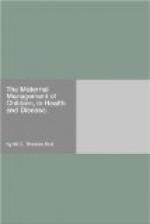Sudden and great mental disturbance, however, will occasionally drive away the milk altogether, and in a few hours. A Mrs. S., aet. 21, a fine healthy woman, of a blonde complexion, was confined of a boy in October, 1836. She had a good time, and a plentiful supply of milk for the child, which she continued to suckle till the following January, a period of three months, when her milk suddenly disappeared. This circumstance puzzled the medical attendant, for he could not trace it to any physical ailment; but the milk never returned, and a wet-nurse became necessary. In the following spring the husband of this lady failed, an adversity which had been impending since the date when the breast-milk disappeared, upon which day the deranged state of the husband’s affairs was made known to the wife,—a fact which at once explained the mysterious disappearance of the milk.
Unwholesome articles of diet will affect the mother’s milk, and derange the infant’s bowels. On the 25th May, 1836, I was called to see an infant at the breast with diarrhoea. The remedial measures had but little effect so long as the infant was allowed the breast-milk; but this being discontinued, and arrow-root made with water only allowed, the complaint was quickly put a stop to. Believing that the mother’s milk was impaired from some accidental cause which might now be passed, the infant was again allowed the breast. In less than four-and-twenty hours, however, the diarrhoea returned. The mother being a very healthy woman, it was suspected that some unwholesome article in her diet might be the cause. The regimen was accordingly carefully inquired into, when it appeared that porter from a neighbouring publican’s had been substituted for their own for some little time past. This proved to be bad, throwing down, when left to stand a few hours, a considerable sediment; it was discontinued; good sound ale taken instead; the infant again put to the breast, upon the milk of which it flourished, and never had another attack.
In the same way aperient medicine, taken by the mother, will act on the child’s bowels, through the effect which it produces upon her milk. This, however, is not the case with all kinds of purgative medicine, nor does the same purgative produce a like effect upon all children. It is well, therefore, for a parent to notice what aperient acts thus through her system upon that of her child, and what does not, and when an aperient becomes necessary for herself, unless she desire that the infant’s bowels be moved, to avoid the latter; if otherwise, she may take the former with good effect.




